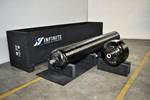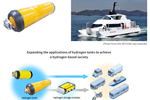Hexagon Purus Maritime supplies hydrogen fuel system for Greenpeace vessel
Composite pressure vessel supplier contributes to 75-meter vessel that will be powered by wind and solar power and features advanced power systems like hydrogen.
Hexagon Purus Maritime (Ålesund, Norway), a wholly owned subsidiary of Hexagon Purus (Oslo, Norway), has received a purchase order for a compressed hydrogen fuel system from Freire Shipyard in Vigo, Spain. The system will be used on Greenpeace’s new 75-meter vessel featuring advanced green technologies, including hydrogen (H2) and e-methanol power systems. The value of the order is approximately €2.5 million (approx. NOK 29 million), and delivery of the H2 fuel system is scheduled for 2027.
The Greenpeace vessel, built by Freire Shipyard and designed by Dykstra, will harness wind and solar power through more than 2,000 square meters of sails, battery packs and solar panels. It will also feature advanced power systems enabling the use of green H2 and e-methanol to meet its remaining energy needs.
“Hexagon Purus is committed to actively leading the way in developing zero-emission alternatives,” says Guillermo Freire, managing director, Freire Shipyard. “After a comprehensive tender process, we became confident that Hexagon Purus Maritime had the ability and highest technical capabilities to deliver on this project.”
In 2023, the International Maritime Organization (IMO) adopted a revised strategy to reduce greenhouse gas (GHG) emissions from international shipping. It includes a common ambition to reach net-zero GHG emissions by 2050 as well as indicative milestones that call for reducing total GHG emissions by up to 30% by 2030 and 80% by 2040 compared to 2008 levels.
Making green H2 available for use in the maritime sector is crucial to reducing the world’s GHG emissions. Green H2 is expected to supply up to 25% of the world's energy needs by 2050.
Hexagon Purus combines maritime experience with extensive H2 storage expertise and the use of composite cylinders to provide a holistic approach to zero-emission maritime solutions.
Related Content
-
Polar Technology develops innovative solutions for hydrogen storage
Conformable “Hydrogen in a Box” prototype for compressed gas storage has been tested to 350 and 700 bar, liquid hydrogen storage is being evaluated.
-
TU Munich develops cuboidal conformable tanks using carbon fiber composites for increased hydrogen storage
Flat tank enabling standard platform for BEV and FCEV uses thermoplastic and thermoset composites, overwrapped skeleton design in pursuit of 25% more H2 storage.
-
ECOHYDRO project to enable recyclable composites for hydrogen storage
With the involvement of two schools from the Institut Mines-Télécom, the 4-year project aims to improve the intrinsic properties of a composite material based on Elium via four concrete demonstrators.

















